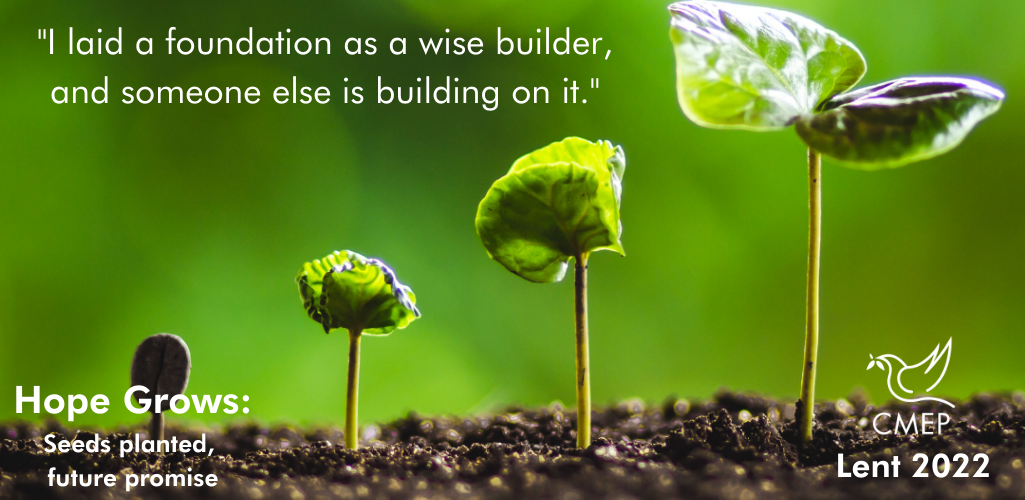
By Kyle Cristofalo, Senior Director of Advocacy and Government Relations at CMEP
“For we are co-workers in God’s service; you are God’s field, God’s building. By the grace God has given me, I laid a foundation as a wise builder, and someone else is building on it. But each one should build with care.” 1 Corinthians 3. 9-10
I do not have a particularly green thumb. One time when I was in Seminary, I accepted a plant-sitting job. The family had stopped their mail and brought their pet with them on vacation. The only task I had was to water their plants. If it rained enough (which it did), I only had to water the inside plants. One simple task. No problem, right? Well, the plants survived, but by the time I left, they were not looking particularly healthy. Perhaps unsurprisingly, I did not receive any future plant-sitting requests.
What does gardening have to do with Lent? What does it have to do with my work at Churches for Middle East Peace? During this season, I have been reflecting on a prayer written in honor of Archbishop Oscar Romero of El Salvador, assassinated due to his criticism of a corrupt government that overlooked the needs of the people. One section, in particular, stands out:
“This is what we are about. We plant the seeds that one day will grow. We water seeds already planted, knowing that they hold future promise. We lay foundations that will need further development. We provide yeast that produces far beyond our capabilities. We cannot do everything, and there is a sense of liberation in realizing that. This enables us to do something and to do it very well. It may be incomplete, but it is a beginning, a step along the way, an opportunity for the Lord’s grace to enter and do the rest. We may never see the end results, but that is the difference between the master builder and the worker. We are workers, not master builders; ministers, not messiahs. We are prophets of a future not our own.”
In Paul’s first letter to the Corinthians, he reminds the leaders of the community that while they play an important role as “co-workers in God’s service,” ultimately, God brings the results to fruition. In other words, “We are workers, not master builders; ministers, not messiahs.” This does not give us an excuse to sit back and wait–indeed the work of being God’s field and building comes with great responsibility. Whether we are master gardeners or struggle to keep plants alive, is irrelevant. The seed is not good because we plant it. We can plant the perfect garden only to have our hard work undone by an animal or a particularly bad storm. It is good because it is part of God’s redemptive work for this world. Our role is not to do everything, but to be faithful to our call to help bring about God’s justice in a world that so desperately needs it.
“We plant the seeds that one day will grow….”
Every day we hear more news of death and destruction throughout the Middle East. In Yemen, 16 million people live on the brink of starvation as the Saudi-led civil war enters its seventh year. In just over the year since President Biden began his term in office, Israel has demolished more than 1,000 Palestinian properties resulting in the displacement of over 1,300 Palestinians. The economic crisis in Lebanon continues without indication it will let up anytime soon. We might be tempted to ask whether it is worth continuing to advocate if the facts on the ground continue to deteriorate by the day. Does our voice really matter? On days when I feel particularly helpless, I remind myself that I am a worker, not a master builder; a minister, and not a messiah. I am not responsible for “solving” all of the challenges faced in the Middle East. Yet, I am not absolved from doing my part, either. The results might seem small, but they are a step along the way, an opportunity for the good seeds planted to blossom into a future in which all of God’s people are finally free.
Creator God, on the days when we feel our work is for nothing, remind us that you have called us to be co-workers in the service of peace and justice for your creation. May we trust that the seeds planted today will one day blossom so that justice will prevail in the Middle East and throughout the world.
_____
Kyle Cristofalo, Senior Director of Advocacy and Government Relations/Special Advisor to the Executive Director. Kyle holds a BA in Peace and Conflict Studies from Messiah College and a Master of Divinity Degree from Emory University’s Candler School of Theology. Kyle was first introduced to Middle East advocacy work during a semester abroad in Cairo, Egypt. After graduating from college, Kyle spent 10 months serving with the Mennonite Central Committee in Bethlehem, Palestine, where he was seconded to work with Bethlehem Bible College.

